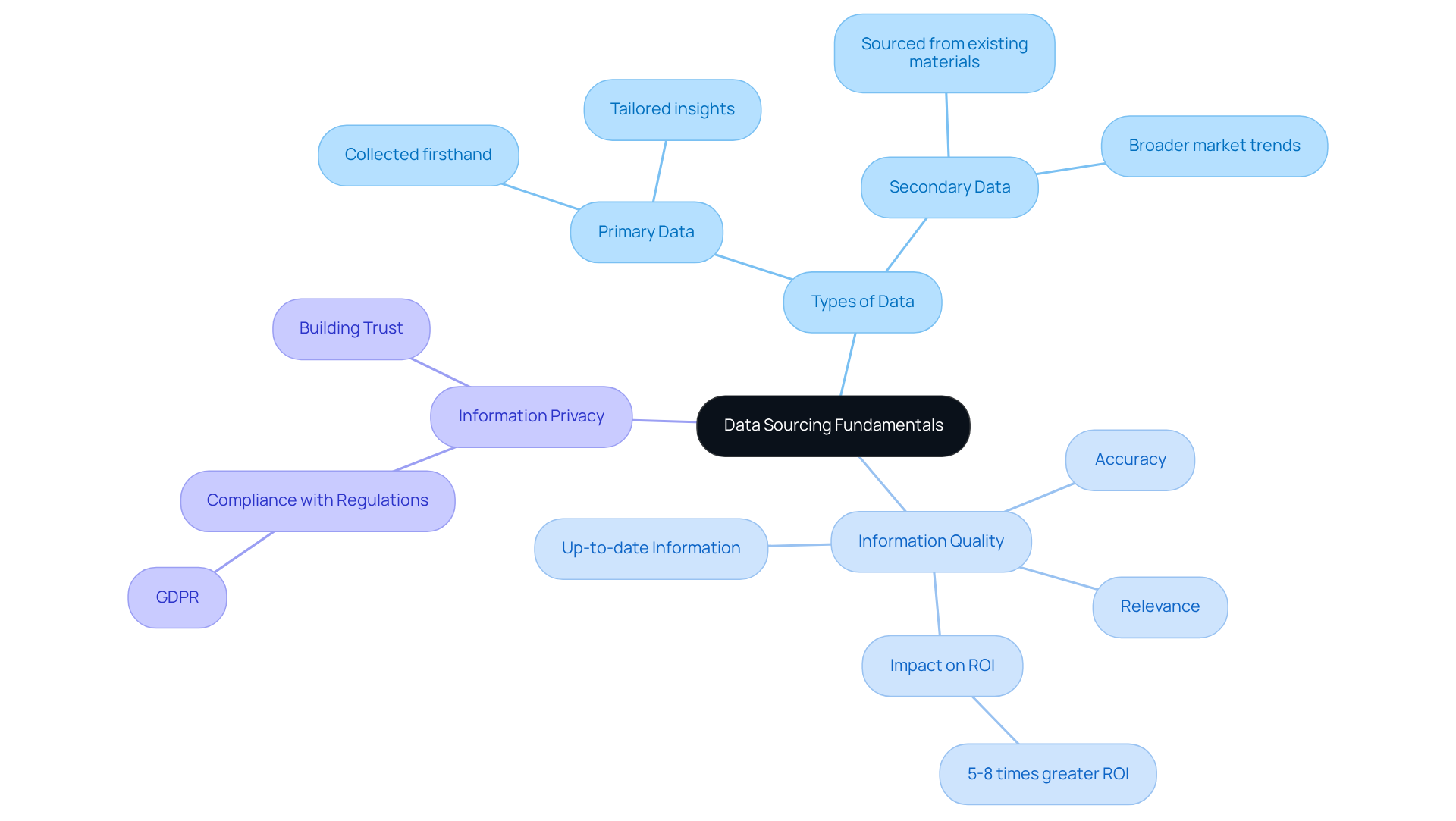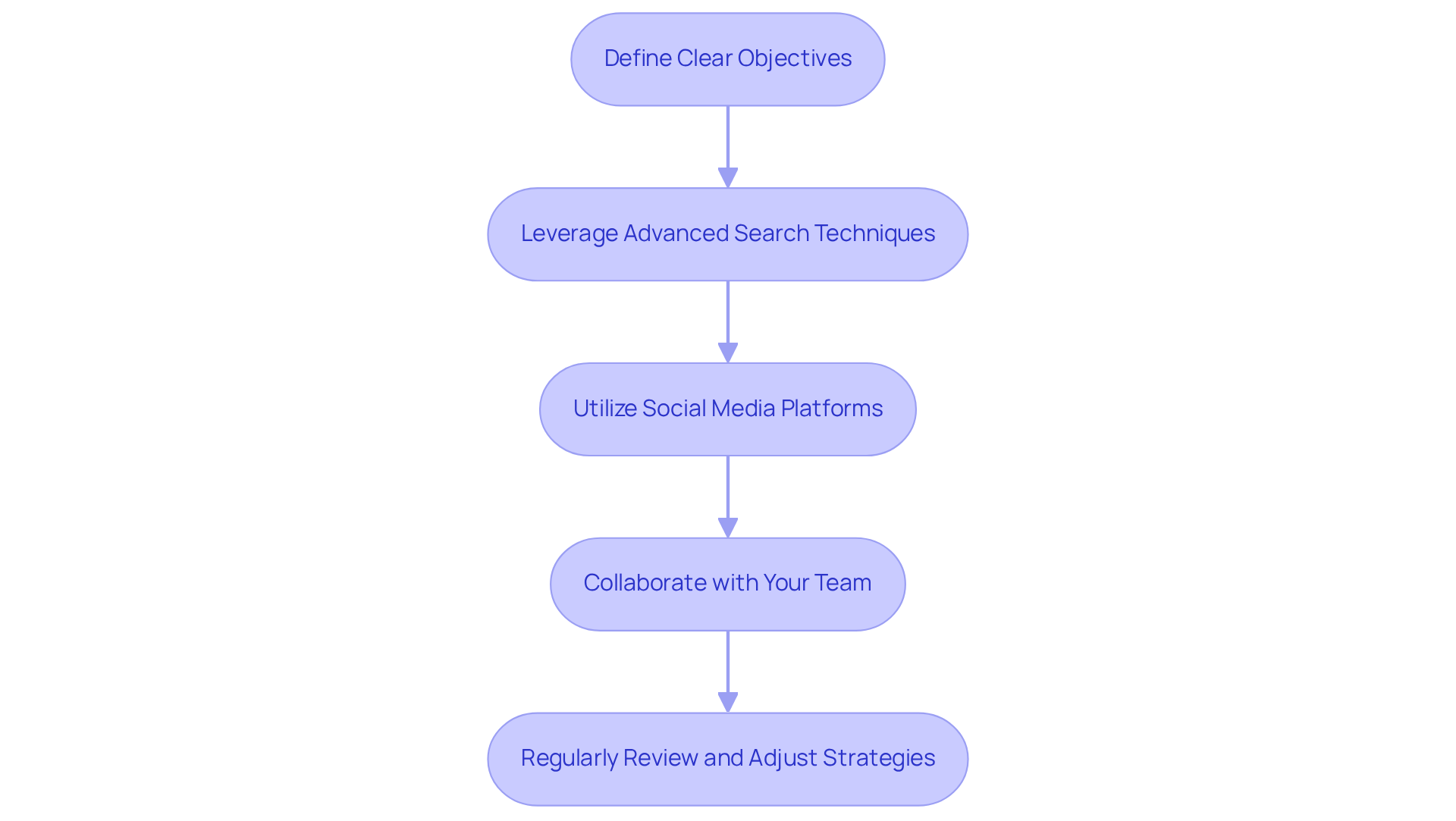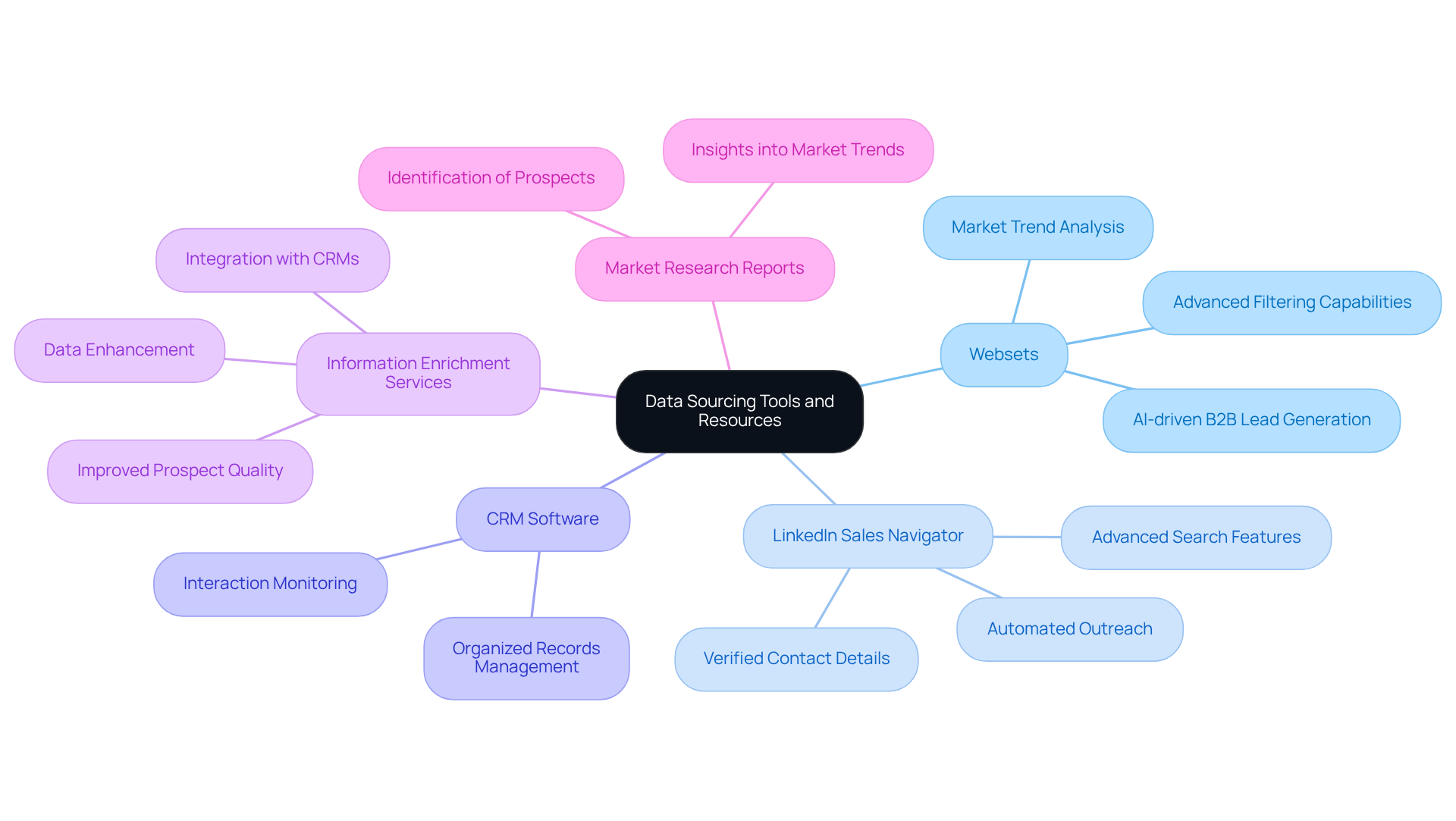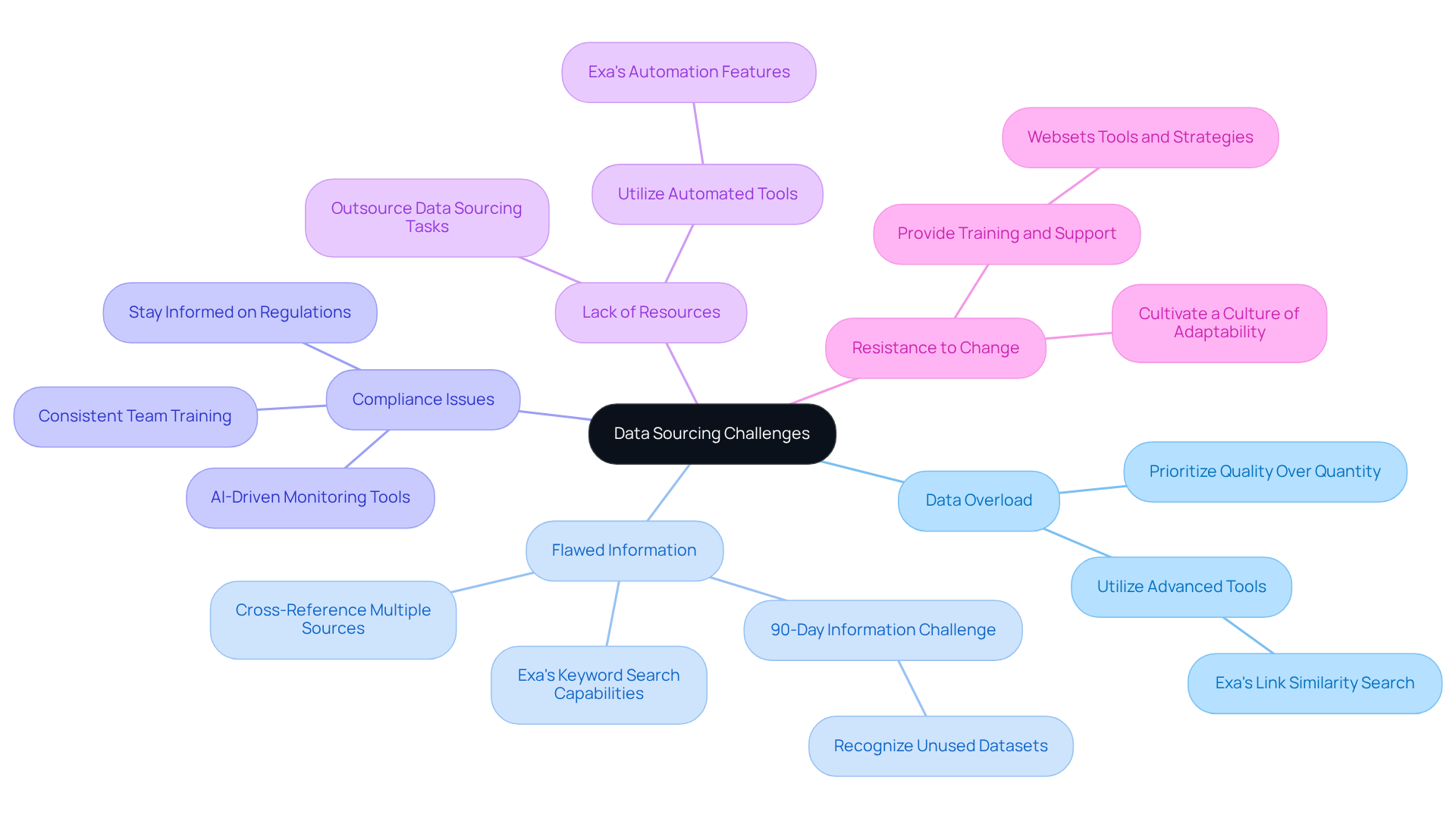Overview
This article presents essential strategies for sales leaders to master data sourcing, underscoring the critical role of high-quality information and effective lead generation techniques. By detailing various data types, it emphasizes the significance of establishing clear objectives and employing advanced search techniques. Furthermore, the integration of AI-driven tools is explored, all aimed at enhancing the effectiveness and efficiency of sales initiatives. Ultimately, these insights are designed to empower sales leaders to elevate their strategies and achieve greater success.
Introduction
Mastering the art of data sourcing is essential for sales leaders navigating today’s competitive landscape. With effective strategies, organizations can leverage high-quality information to enhance sales performance and generate valuable leads. Yet, a significant challenge persists: how can sales leaders sift through the vast sea of data to pinpoint what truly matters? This article explores key strategies for mastering data sourcing, equipping sales leaders with the necessary tools and insights to overcome common obstacles and excel in their pursuit of success.
Understand Data Sourcing Fundamentals
Sourcing data is a vital process that involves identifying, collecting, and analyzing information aligned with your sales objectives. Understanding key concepts is essential:
- Types of Data: It is crucial to distinguish between primary data, collected firsthand, and secondary data, sourced from existing materials. Sales leaders must prioritize essential information for its precision and significance in prospect generation. Notably, 44% of revenue leaders report challenges in locating high-caliber candidates, underscoring the necessity for trustworthy information sources. Websets' AI-powered sales intelligence search can help overcome these challenges by enabling precise lead generation at scale, allowing you to find companies and individuals that match hyper-specific criteria.
- Information Quality: High-quality information is the cornerstone of effective decision-making. Ensuring that the information is accurate, relevant, and up-to-date is essential to prevent costly mistakes in strategy and execution. Organizations that embrace information-driven strategies achieve five to eight times greater ROI than those that do not, highlighting the importance of information quality. Utilizing AI-driven tools from Websets can enhance information quality by enriching leads with comprehensive details, including emails, company information, and positions, thus providing a competitive edge in the market.
- Information Privacy: Understanding protection regulations, such as GDPR, is crucial for compliance when acquiring information. This knowledge safeguards your organization against legal repercussions and builds trust with your audience.
Clearly defining your target audience streamlines the process of sourcing data. Understanding your target audience enhances your search criteria and techniques for sourcing data, which boosts the effectiveness of your information gathering. As Parm Uppal emphasizes, focusing on actionable insights derived from information is essential for successful marketing strategies. Websets' AI-driven candidate discovery tools can assist recruiters and VCs in identifying talent and startups with enhanced insights, further refining your target audience.
By mastering these fundamentals and leveraging advanced AI-driven tools, sales leaders can establish a robust foundation for their information-gathering initiatives, ultimately driving improved results in prospect generation and sales performance.

Implement Effective Data Sourcing Strategies
To implement effective data sourcing strategies, consider the following steps:
-
Define Clear Objectives: Establish specific goals for your information gathering efforts, such as generating a targeted number of leads or identifying particular candidate profiles. Clear objectives guide your approach and help measure success. With only 3% of your target market actively purchasing, the necessity for clear goals in your procurement efforts becomes evident.
-
Leverage Advanced Search Techniques: Utilize Websets' AI-powered search engine, specifically designed for complex queries, to refine your results. Employ Boolean operators and filters to enhance relevance; for instance, using quotes for precise phrases or minus signs to exclude unrelated terms can significantly improve your information gathering. Additionally, the Research Agentic API continues researching until it outputs the correct answer or report, ensuring comprehensive results. This method is crucial, as 90% of B2B buyers review multiple websites before making a purchase, underscoring the importance of precise targeting. Moreover, cultivating prospects can generate 20% more sales opportunities, illustrating how efficient sourcing data can lead to improved conversion rates.
-
Utilize Social Media Platforms: Platforms like LinkedIn are invaluable for sourcing prospects and candidates. Engaging with potential contacts through networking and content sharing can yield substantial results. In fact, 79% of B2B marketers consider social media effective for client acquisition, with LinkedIn representing 80% of social media opportunities.
-
Collaborate with Your Team: Foster collaboration among sales and recruitment teams to share insights and strategies. This collaboration enhances the overall efficiency of your data gathering efforts by sourcing data from varied viewpoints, which can lead to more creative methods. Websets' capabilities in candidate discovery and qualification can further enrich your recruitment process by filtering candidates based on skills, experience, and location.
-
Regularly review and adjust strategies by continuously analyzing the effectiveness of your sourcing data. Be prepared to adjust according to performance metrics and feedback, as 73% of prospects are not ready to make a purchase upon first interaction, emphasizing the significance of flexibility in your approach. Remember, 80% of new prospects never convert into sales, highlighting the importance of quality over quantity in your prospect generation efforts. Utilizing Websets' comprehensive information processing capabilities can help ensure that your content remains relevant and actionable.

Utilize Tools and Resources for Data Sourcing
To optimize your data sourcing efforts, leverage these essential tools and resources:
-
Websets: This AI-driven platform excels in B2B lead generation, enabling users to filter through extensive datasets to pinpoint specific individuals or companies. Its advanced algorithms enhance the precision and relevance of prospects, making it a favored option for sales teams. Websets not only provides profound insights into companies and industries but also enriches contact information with email addresses, company details, and professional backgrounds. This capability assists users in effectively analyzing market trends and competitor landscapes.
-
LinkedIn Sales Navigator: A powerful tool for sourcing data related to prospects and candidates, it offers advanced search capabilities and insights into potential connections. Over 70% of sales experts affirm that it significantly enhances their prospect generation efforts, demonstrating its efficacy. This tool allows users to access verified contact details and automate outreach, streamlining the prospecting process.
-
CRM Software: Utilize customer relationship management tools to effectively monitor interactions and manage prospects. These systems help maintain organized records, ensuring that no potential opportunity is overlooked.
-
Information Enrichment Services: Employ services that focus on sourcing data to enhance your existing information with additional details, such as verified contact information and company insights. This can substantially improve the quality of prospects, considering that approximately 30% of customer and potential information becomes obsolete each year. Integrating enrichment tools with current CRMs can enhance overall sales processes.
-
Market Research Reports: Access industry-specific reports to gain insights into market trends and identify potential prospects or candidates. These reports provide valuable context that informs your outreach strategies, ensuring you target the right prospects effectively.

Troubleshoot Common Data Sourcing Challenges
Common challenges in sourcing data can significantly impact decision-making and operational efficiency. Recognizing and addressing these challenges is essential for success.
-
Data Overload: The vast amounts of data available can be overwhelming. Prioritize quality over quantity by establishing specific criteria for your searches. Research indicates that excessive information can lead to 'infoxiety,' 'infobesity,' or 'infoxication,' negatively impacting decision-making. Utilizing advanced tools such as Exa's link similarity search can help optimize this process by identifying pertinent information more efficiently.
-
Flawed Information: Ensuring information accuracy is paramount. Cross-reference multiple sources and maintain regular updates to your databases. Executing a '90-day information challenge,' as proposed by Balaji Dhamodharan, can assist in recognizing and storing unused datasets, optimizing your management process. Utilizing Exa's keyword search capabilities can enhance the precision of your sourcing data efforts.
-
Compliance Issues: Staying informed about information protection regulations is crucial to avoid legal pitfalls. Consistent training for your team on compliance can greatly reduce risks linked to information handling. Incorporating AI-driven tools can also assist in monitoring compliance more effectively.
-
Lack of Resources: For smaller teams, outsourcing data sourcing tasks to specialized firms or utilizing automated tools can save valuable time and enhance efficiency. Automation has been shown to improve the quality and speed of client interactions, particularly in data-intensive environments. Tools like Exa can facilitate this automation, allowing teams to focus on strategic initiatives.
-
Resistance to Change: Cultivating a culture of adaptability within your team is essential. As David Bennett emphasizes, recognizing what information is essential for business growth is crucial. Provide training and support to help them embrace new tools and strategies, such as those offered by Websets, ensuring they are equipped to leverage advanced data management technologies effectively.

Conclusion
Mastering data sourcing is not merely a tactical advantage for sales leaders; it is a fundamental necessity in today’s competitive landscape. Understanding the intricacies of data sourcing—such as the types of data, the importance of information quality, and the need for compliance—enables sales leaders to harness information effectively, driving their strategies and achieving their sales objectives.
Key strategies highlighted in the article include:
- Defining clear objectives
- Leveraging advanced search techniques
- Utilizing social media platforms
- Fostering team collaboration
- Regularly reviewing and adjusting sourcing strategies
Each of these elements is crucial in optimizing the data sourcing process, ensuring that sales leaders can efficiently identify and engage with high-quality prospects.
The significance of effective data sourcing cannot be overstated. It empowers sales teams to make informed decisions, enhances prospect generation, and drives revenue growth. Embracing advanced tools and resources, such as AI-driven platforms and CRM software, will not only streamline data sourcing efforts but also position sales leaders to navigate the complexities of the market with confidence. Investing in these strategies is essential for achieving sustainable success in sales.
Frequently Asked Questions
What is data sourcing and why is it important?
Data sourcing is the process of identifying, collecting, and analyzing information that aligns with sales objectives. It is important because it helps sales leaders generate precise leads and improve sales performance.
What are the two main types of data in sourcing?
The two main types of data are primary data, which is collected firsthand, and secondary data, which is sourced from existing materials.
What challenges do sales leaders face regarding data sourcing?
Sales leaders often face challenges in locating high-caliber candidates, with 44% reporting difficulties in finding trustworthy information sources.
How can AI-powered tools assist in data sourcing?
AI-powered tools, like those from Websets, can enhance lead generation by enabling precise searches that match hyper-specific criteria, thus improving the efficiency of data sourcing.
Why is information quality crucial in data sourcing?
High-quality information is essential for effective decision-making, as it prevents costly mistakes in strategy and execution. Organizations using information-driven strategies achieve significantly greater ROI.
What role does information privacy play in data sourcing?
Understanding protection regulations, such as GDPR, is vital for compliance when acquiring information. This knowledge helps safeguard organizations against legal issues and builds trust with their audience.
How does defining a target audience impact data sourcing?
Clearly defining a target audience streamlines the data sourcing process by enhancing search criteria and techniques, which boosts the effectiveness of information gathering.
What tools can help in identifying talent and startups?
Websets' AI-driven candidate discovery tools can assist recruiters and venture capitalists in identifying talent and startups by providing enhanced insights that refine target audience definitions.
What is the overall benefit of mastering data sourcing fundamentals?
Mastering data sourcing fundamentals and leveraging advanced AI-driven tools helps sales leaders establish a strong foundation for information-gathering initiatives, ultimately driving improved results in prospect generation and sales performance.




